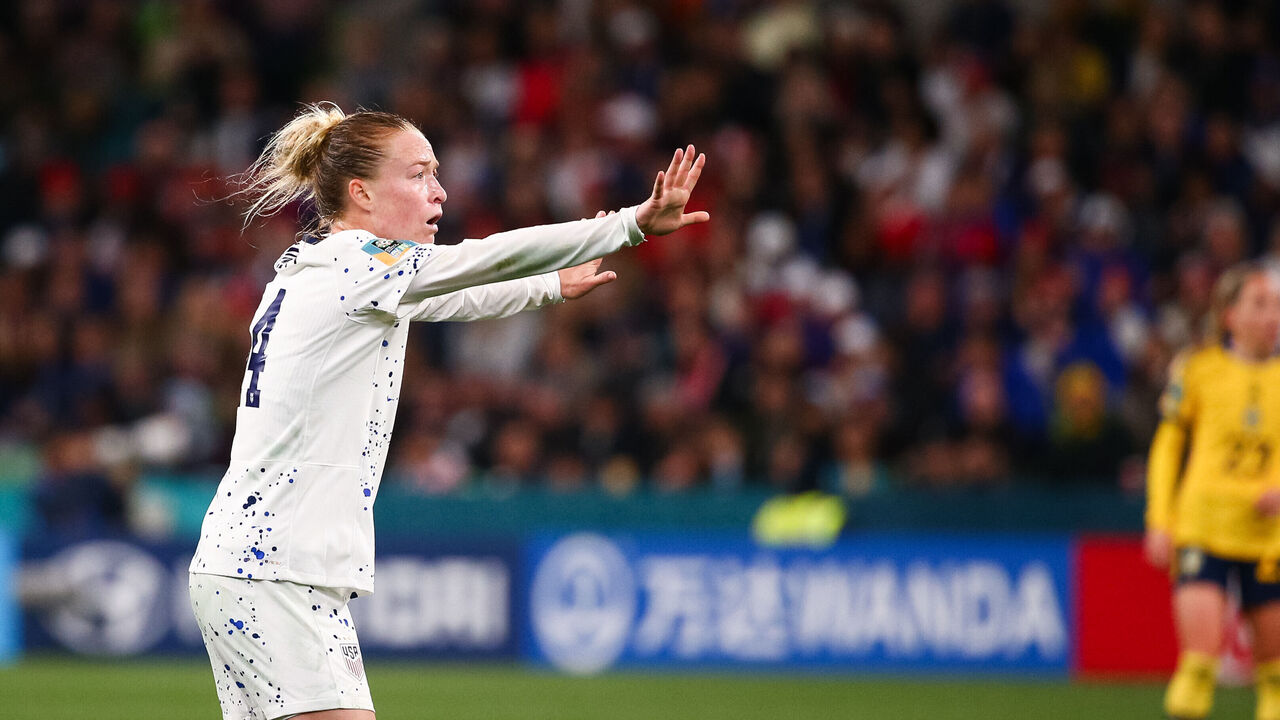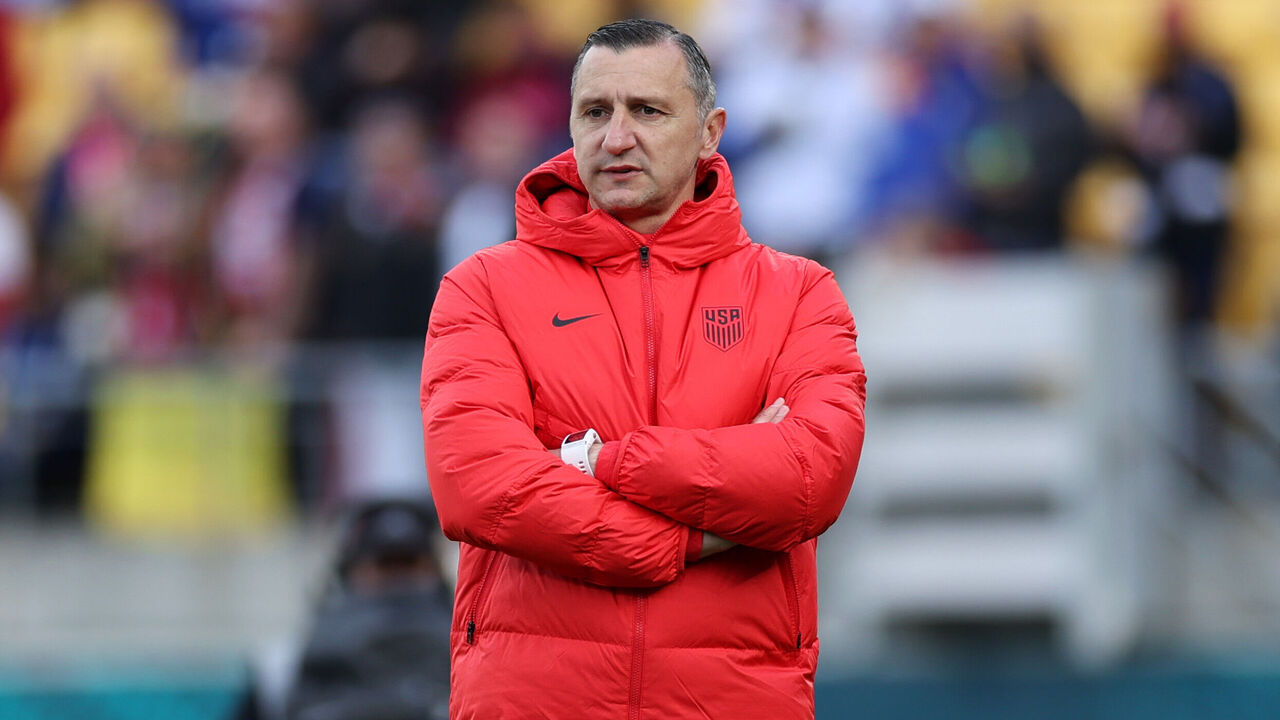5 takeaways as U.S. suffers earliest-ever Women's World Cup exit
The United States' quest for a historic three-peat is over. The Americans were eliminated from the Women's World Cup in dramatic fashion Sunday, falling 5-4 to Sweden in a shootout after 120 tense minutes of goalless action. The defeat signals the U.S.' earliest-ever exit at the tournament and the first time it has failed to reach at least the semifinals at any Women's World Cup. Here are five takeaways from a stunning loss that could have significant ramifications for the program.
Musovic stands on her head
Let's start with the only reason Sunday's contest stayed scoreless over 120 minutes and required a penalty shootout at all: Zecira Musovic. The Swedish goalkeeper was immense at the Melbourne Rectangular Stadium, making 11 saves to stymie the Americans at every turn, including one jaw-dropping fingertip stop on a fierce Lindsey Horan strike that looked destined to find the net when it left the U.S. captain's foot. She also denied a close-range Alex Morgan header in the waning minutes of normal time and came up huge when called upon in extra time, too.
Musovic, the 27-year-old Chelsea shot-stopper who replaced the legendary Hedvig Lindahl between the sticks for this tournament, was, unsurprisingly, named Player of the Match after her sparkling outing.
The United States' performances have caused much consternation and handwringing during the World Cup - more on that soon - but this was a legitimately good showing undone by an even better display from the opposing 'keeper. It happens.
🇺🇸 USA 0-0 Sweden (4-5 on pens) 🇸🇪
— Opta Analyst (@OptaAnalyst) August 6, 2023
The four-time record #FIFAWWC winners United States are OUT of the 2023 tournament, losing on penalties to Sweden.
This is the earliest that the USA have ever been knocked out of the Women's World Cup. pic.twitter.com/ZmOW6arhL1
It's deeply unsatisfying to chalk up such a devastating defeat to something so simple, but sometimes you just get goalied.
Sonnet makes huge impact
Vlatko Andonovski was lambasted for his tactical and personnel choices throughout the tournament - those decisions will be dissected for quite some time in the wake of the Americans' early ouster - but his selection of Emily Sonnett on Sunday, and the formation tweak that accompanied her inclusion, had an overwhelmingly positive impact on the team's play.
The versatile OL Reign star, who can operate both in defense and midfield, replaced the suspended Rose Lavelle against Sweden, slotting into a holding midfield role alongside Andi Sullivan in the United States' 4-2-3-1 formation. Whether Andonovski would've made the tactical switch were Lavelle available is debatable, but it obviously helped transform the team and provide more balance.
Sullivan wasn't tasked with covering huge amounts of ground and subduing opposing counterattacks all on her own - something she struggled with earlier in the tournament - and with the dogged and positionally astute Sonnett providing additional cover, Horan had freedom to drive forward and find dangerous attacking positions in the box.

It simultaneously made the U.S. more threatening going forward while helping to filter Sweden away from the center of the pitch and out wide; the Swedes mustered just one shot on target prior to the shootout, and that came in the 83rd minute.
Why Andonovski didn't try this earlier in the competition is staggering.
Abandoning the 4-2-3-1 setup, which it used in the months prior to the tournament, in favor of a 4-3-3 put the U.S. on the back foot in the group stage and inhibited the immense talent at Andonovski's disposal.
Pressure changes everything
"This is like a sick joke. For me personally, I'm just like, 'This is dark comedy. I missed a penalty,'" Megan Rapinoe said after her final World Cup match. "I think it can be cruel and just not our day."
Rapinoe is a two-time World Cup champion, an Olympic gold medalist, a Ballon d'Or winner, and one of the most iconic players in the history of the women's game. Sophia Smith is the reigning NWSL MVP and one of the most lethal finishers in the world. Kelley O'Hara is among the most decorated players around and a stalwart of this dominant U.S. era.
All three failed to convert their penalties in Sunday's shootout.
Rapinoe and Smith, in astonishing fashion, missed the net entirely, sending wayward efforts into the crowd from 12 yards out; Smith stepped up with a chance to send the U.S. into the quarterfinals. O'Hara, meanwhile, clipped the outside of the post, giving the Swedes the opportunity to win the match, a chance that Lina Hurtig took, just barely, to send the Americans home.
Alyssa Naeher nearly kept it out 🧤 pic.twitter.com/DjpatlgCKD
— FOX Soccer (@FOXSoccer) August 6, 2023
No matter how experienced or accomplished, pressure can have a profound impact on any player.
"Megan Rapinoe is a legend. If I had my life on the line right now, and I had to pick who was going to take the penalty, Megan Rapinoe is my choice," Andonovski told reporters after the match, according to Andrew Das of the New York Times.
End of the line for Vlatko?
It's cruel that the U.S. was ousted after playing its best game of the tournament, but that likely won't save Andonovski's job. When you strip away the dramatic ending and the infinitesimally tiny margin that ultimately decided the United States' fate, this World Cup was an abject failure for the most successful program in the history of women's international football.
The U.S. had never before failed to reach the semifinals of the competition and never finished worse than third at the Women's World Cup. Prior to Sunday's improved performance, the team was legitimately dull to watch on the field, a byproduct of Andonovski's tactics, and bowed out with a 238-minute scoring drought, its longest in tournament history.
By any possible metric, this was a disaster.

Andonovski, hired four years ago to succeed two-time World Cup-winning manager Jill Ellis, has now overseen 10 matches at major international tournaments. The U.S. has won only four of them, and just three in normal time, following up a disappointing bronze medal at the Olympics in Tokyo with this incomprehensible early World Cup exit.
"I never came into this job with the mindset of saving my job," an emotional Andonovski said while navigating the postgame haze. "It is a very tough moment. We did not expect to go out the way we did. ... I have not really had a chance to think about me."
He may not have been thinking about his position on the U.S. bench in the aftermath of Sunday's defeat, but he probably just lost it.
New era starts now
Amid all the inevitable doom and gloom that will dominate the discourse in the coming days and weeks, it's important to find the positives, even if they weren't exactly plentiful in Australia and New Zealand.
The U.S. has an opportunity to regroup and start fresh with a new generation of stars. Rapinoe had already announced prior to the tournament that this World Cup would be her last. Julie Ertz, 31, followed suit after Sunday's loss, retiring from international duty. Morgan, 34, wasn't at her prolific best over the four games.
Potentially losing so many talismanic figures at once is frightening, but the U.S., as always, is still stocked with young talent.

Naomi Girma, 23, was an absolute rock at the World Cup. The defender, so composed at all times, was the team's standout player and should be the leader of the U.S. backline for the next decade. Explosive forwards Smith and Trinity Rodman are 22 and 21 years old, respectively. Emily Fox is still only 25. Midfielder Alyssa Thompson, meanwhile, doesn't turn 19 until November.
And let's not forget Mallory Swanson (25) and Catarina Macario (23), two game-changing talents who missed the World Cup due to injuries. They'll play a significant role going forward.
Important as it is to analyze why things unraveled over the last few weeks, there's reason for optimism looking ahead to the Paris Olympics, which get underway in less than 12 months.
"For this team, the future is bright," insisted Andonovski. "Even if it didn't end the way we wanted, this is a huge experience for some of these young players. There is a group of players here that will make a mark in the future."